Robbie Semple
On Purpose London April 2013 Fellow, then Founder and Executive Director of Worthwhile, now Scale Manager at Social Entrepreneurs Ireland

In my former job [in Human Resources at Rolls-Royce] I’d been trying to have conversations about social enterprise, sustainability and so on, but it was difficult. So coming to On Purpose and being suddenly surrounded by 13 other people feeding off the same interests and asking the same questions was very powerful. It was brilliant.
Worthwhile UK grew out of my second On Purpose placement [at Student Hubs]. When I started the placement, I had no intention of starting an organisation. It was just a six-month consulting project. As I was working on it, it became more and more obvious that while I didn’t feel remotely qualified to do it, I couldn’t see anyone out there who was more qualified and yet would be willing to work at the salary that we could afford. I felt completely in over my head and in the deep end from the start.
The thing I found hardest about starting an organisation is that you are constantly working on the thing you are worst at. Just as you figure it out and get beyond crisis point, you need to change tack and deal with the next crisis, in a completely new area. My initial reaction was to work all the hours of the day. I’d do 80, 90, 100 hours a week. It became obvious to me quite quickly that that was a terrible idea. Ultimately, I wasn’t very productive. It was hard managing the stress and anxiety that came with the job. It took discipline to draw boundaries and create some mental space for myself, because it’s just so all-consuming from the start.
When we first started [the Worthwhile Graduate Scheme], we thought it was a great idea to provide housing for everyone on the scheme. In the third year, two weeks before the programme was to start, our housing arrangement fell through. So we had six people coming to London, and nowhere for them to live.
That phone call left dread in my gut. It was sickening. Housing became top priority and we worked on it day and night. We finally found a good place, but the landlord knew he had us over the barrel and played hardball in negotiations. We ended up making it work, but it gave us major cashflow uncertainties for months. We had to pay a huge deposit, and it turned out that because of a loophole, the landlord wasn’t legally required to return our deposit. We could have sued, but if he decided to hold on and take it through the courts, it could have been years of legal fees. It was a ten-month saga, going back and forth between stakeholders and investors and explaining what had happened. Losing the money would have bankrupted us. We would have let so many people down.
The biggest lesson was learning to sit with uncertainty, with fear, with anger, with shame. Sometimes I noticed that my internal reactions were irrational and over the top. I learned to deal with those feelings consciously, spot when they were about to happen and stop myself before reacting like that.
But I really enjoy our work at Worthwhile. I’m confident that we have done no harm and helped lots of people figure out what they want to do, and how to get there.
One of our graduates realised through the scheme that she was really interested in the role that space plays in social connection. Toward the end of the year, she figured that she wanted to do a Masters in horticulture. Her experience with Worthwhile had given her the insight that she was interested in people, and interested in spaces, and wanted to bring those interests together. I saw her two weeks ago, and that’s exactly what she’s doing now. She’s in a consultancy that looks at how space can bring rural communities together. What gives me great satisfaction is seeing people really think through what they want to see happen, and how to make it happen.
We’ve had a number of alumni start their own organisations, including Will Churchill at UniHack, Sarah Hewett and Monthlies, and Dom Falcao at Deep Science Ventures. We’ve had graduates go on to work in big organisations like the UN, OxFam; funders like Nesta, and Bristol and Bath Regional Capital; thinktanks like the New Economics Foundation; politics with Labour, the Lib Dems and the Greens; frontline organisations like the Clement James Centre and Guideposts. The new CEO of our sister organisation, Student Hubs is a Worthwhile Alumnus, so it feels like we have come full circle!
To any fresh graduate who wants to go into social enterprise, I’d say go for it. Between ourselves, Charity-Works, Year Here, Frontline, Think Ahead, Police Now — there is amazing infrastructure in the sector now. While the advice to me in Ireland ten years ago was “don’t join a charity because you’ll just end up making coffee for three years and then end up without a job”, I can safely say that that is not the case in the UK today. There are great opportunities for young people to go out there and engage with big social issues, and loads of personal and career support to go with them. So jump in.
